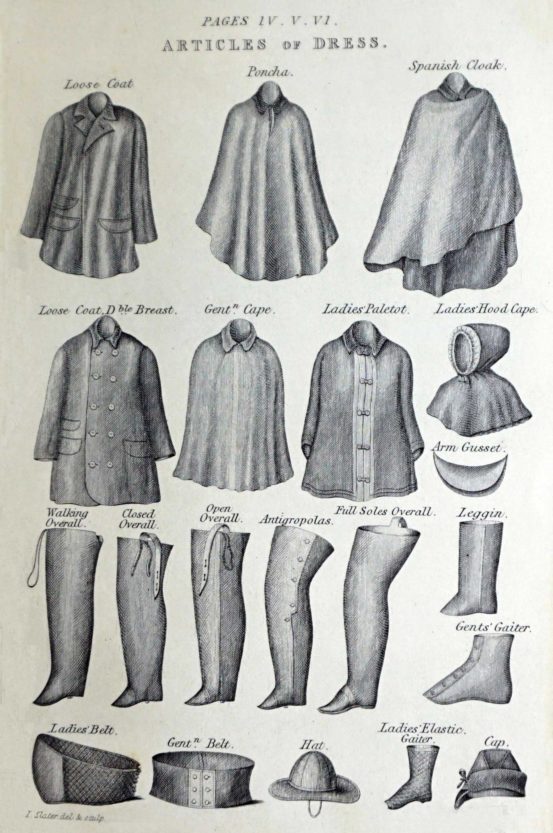Thomas Hornby Birley
Thomas Hornby Birley (1815-1885) was a cotton manufacturer; india rubber merchant; Governor of Owen’s College; Conservative; churchman and JP. Thomas Hornby Birley was born in Blackburn the son of Joseph Birley and Jane Hornby. His younger brother, Hugh Hornby Birley was Tory MP for Manchester for 15 years. Both were educated at Winchester School and became partners in Richard Birley & Co, cotton manufacturers and Charles Macintosh & Co, manufacturers of india rubber goods. Birley and his family lived at Hart Hill from 1865 to 1884.
Richard Birley and Company, cotton manufacturers. Birley family wealth originated in the 18th century when Thomas Hornby Birley’s grandfather Richard Birley (1743-1812) operated as a ‘putter-out’, distributing warps to handloom weavers in the Kirkham area, probably for the production of sails for the navy. Later Richard Birley purchased a share in a spinning mill at Scorton, opening a warehouse at Clayton Street in Blackburn with his brother-in-law John Hornby. In 1794 their joint assets were valued at £147,786.
In 1809 the Birleys bought what is now known as the Chorlton Old Mill, Manchester from Robert Owen prior to his move to New Lanark. They improved the mill with a new gas plant and more powerful engines for their spinning and weaving venture.
By 1837 Birley and Company employed 1600 workers in spinning and weaving in their Manchester mill with a workforce wage bill of £40,000 per annum. With 80,000 spindles, requiring 4 million pounds of cotton, plus a weaving shed of 600 looms, they were one of the largest cotton manufacturers in the mid nineteenth century.
Charles Macintosh and Company In 1823 Macintosh discovered a method of dissolving india rubber with naphtha. Macintosh painted the rubber solution onto cloth, placed another piece of cloth on top and created a prototype waterproof fabric which he patented.
In 1825 the Birleys (with Kirk and Barton) built a factory on the Cambridge Street site to manufacture Macintosh’s waterproofed fabric using their cotton cloth. Macintosh did not invest directly in the venture but gave his name to the company and contributed the patent rights in return for a share of the profits.
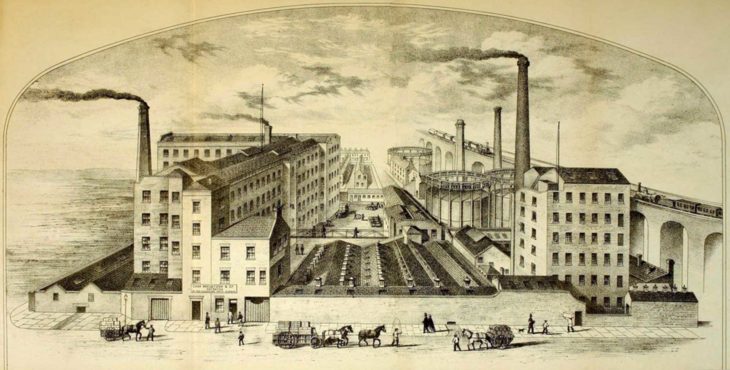
However, the early development of water-proofed clothing was fraught with difficulties and set-backs for the Birleys. In 1827 the Admiralty returned specimens of india rubber cloth, a canteen and lifesaver jackets, despite their waterproof qualities, because of the high price and inflammability. The rapid deterioration of early rubberised clothing, the weight, odious smell of sweat, and occasional melt down was ridiculed in the press! But despite the offensive stench they emit and the hazards of wearing them Macintosh and Co persevered bringing in notable scientist, Thomas Hancock, to help them improve their product and develop new uses.
A few examples of Charles Macintosh & Co’s extensive range of india rubber products from their 1853 trade catalogue (above). The company were the market leaders selling their products worldwide, especially the waterproof cloths which were used in the manufacture of the ‘mac’.
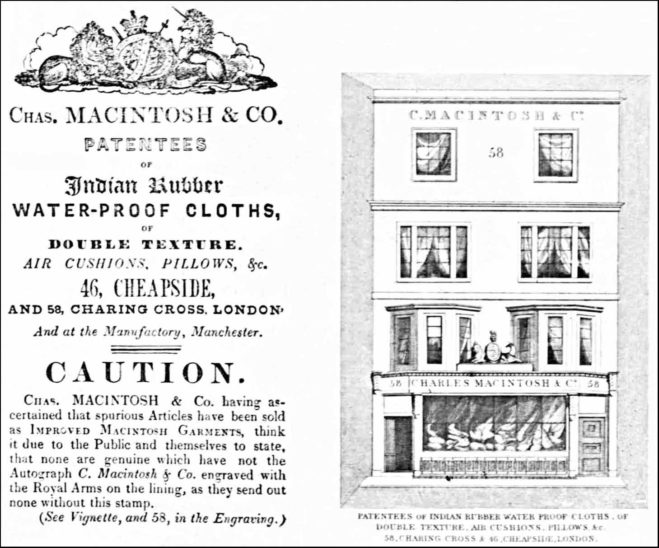
The Birleys set up a research lab in their factory and successive improvements in rubber manufacture eventually revolutionised outdoor clothing leading to the familiar mac appearing on British streets where it still can be seen to this day. As a result Manchester became the main centre for the production of macs by the 1850s. With the discovery of the vulcanisation process in 1839, whereby rubber was made more durable, an endless variety of uses for india rubber was developed culminating in a gold medal for Charles Macintosh & Co at the Great Exhibition in 1851.
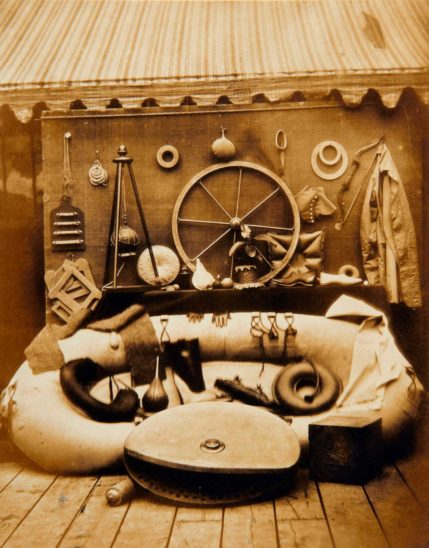
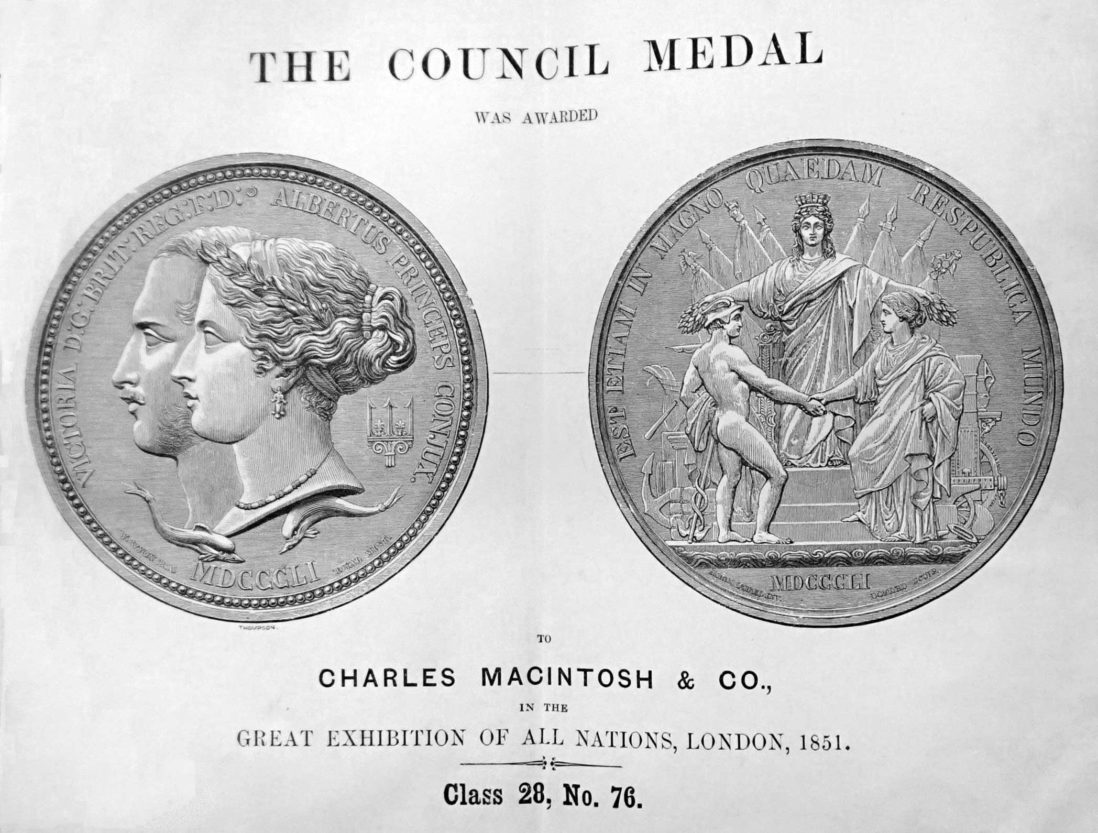
The Birleys sold out to Dunlop in 1926 for £2.5m who continued to manufacture on the Manchester site until the end of the century.
The Birleys at Hart Hill Many of Richard Birley’s descendents eventually settled in the Eccles and Pendleton districts in the nineteenth century taking up residence in some of the larger houses such as Broom House, Summerville and Hart Hill. The parish registers of St Mary, Eccles contain numerous Birley births, marriages and deaths over a period of thirty years from the mid 1830s.
Before moving to Hart Hill Thomas Hornby Birley and his family lived at Highfield House in Heaton Norris. Birley put Highfield House up for sale in August 1864 and shortly after moved to Hart Hill, then newly built with all the modern conveniences. Thomas Birley and Anne Leatham married in 1843 and four of their children survived infancy. 1866 was, however, a tragic year for the family, first with the death of James Leatham Birley at the age of 18 whilst an undergraduate at Trinity College, Oxford, and later that year Anne died at the age of 46. Thomas remained a widower for the next two decades, living with his two unmarried daughters at Hart Hill until a year before his death in 1885 when the family moved to nearby Seedley Terrace.
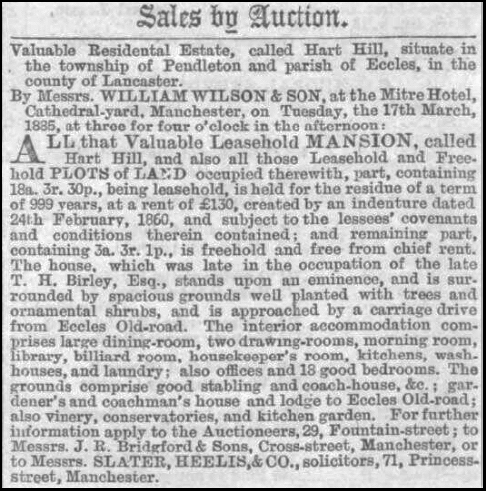
Birley’s three surviving children were Caroline (1851-1907) who became a noted geologist and author of children’s books, Francis (1850-1910) who entered the law and was an all-round sportsman who played in FA cup finals and Anne Katharine (1845-1923 ) who lived out her life in Pendleton where she was actively involved at St Luke, Weaste.
T H Birley was a lifelong Tory assuming the role of Chair of the Manchester Conservative Association. His donations to worthy causes are noted in the Manchester newspapers. Alongside this he appeared to make good use of the conservatories and hot and cold houses at Hart Hill, winning prizes for his celery, grapes, plate of fruit, fuschias, stocks and ferns at local shows. On leaving Hart Hill in 1884 his valuable collection of conservatory plants was advertised for sale in the local press.
Birley died in January 1885 and in March Hart Hill was put up for sale. His long and detailed obituary in the Manchester Courier creates a picture of a complex and irascible man who, nevertheless, contributed his time to worthy causes. Reputedly declining a baronetcy from Lord Beaconsfield towards the end of his life, Birley was buried with other members of his family at St James, Didsbury. Thomas Hornby Birley died intestate leaving a gross personal estate of £63,181s 17d. Letters of administration were granted to his son Francis Hornby Birley.
DEATH OF MR. THOMAS HORNBY BIRLEY. We deeply regret to announce the death of Mr. Thomas Hornby Birley, which took place at his residence, Seedley Terrace, Seedley-road, Pendleton, on Monday. The deceased was a member of a family whose name has long been familiar household words in Manchester, Salford, and the immediate neighbourhood……….. Simple in his habits, quiet and unobtrusive in manner, be was, nevertheless, very firm, methodical, and resolute all his actions. Unostentatious, and without the slightest taint of affectation……….. he was unimpeachably consistent and straightforward in all he said and did. At times he appeared to be somewhat brusque and captious,………. but those who understood his nature were never offended at anything he said……….The deceased was born on the 11th of May, 1815. being the second son the late Mr. Joseph Birley, of Ford Bank, Didsbury, who was a deputy-lieutenant of the county. He was one of eight sons, and the only surviving brothers now are the Rev. Canon Birley, Rector of St. Philip’s, Hulme; the Rev. Alfred Birley, Vicar of Bolton-le-Sands, near Lancaster; Mr. Herbert Birley, the respected chairman of the Manchester School Board, and also of Salford School Board; Mr. Henry Birley, and Mr. Arthur Birley. Mr. Hugh Birley, the third son, was, as everyone knows, the esteemed representative of the Conservative party of Manchester in the House of Commons for a considerable period……….. Mr. Thomas Hornby Birley was educated at Winchester. On the 3rd August, 1843, be was married to Ann, daughter of Lieutenant-colonel Leatham, of the lst Dragoon Guards. He had issue of two sons and two daughters. The first. James Leatham Birley, died in February, 1866; and his second son, Francis Hornby Birley, a barrister, and the two daughters, are still living. He was admitted a member of the firm of Macintosh and Co., Lower Cambridge-street, upwards of 40 years ago, and his connection therewith was never severed………. From his youth he identified himself closely with the Conservative party………. He was a firm believer and supporter of the principle of Church and State as the basis of the Constitution, and it needs scarcely be said, therefore, that he was a staunch friend of the Northern Church Defence Association. For a very long period he was an annual subscriber to the funds of that organisation, and he was one of its vice-presidents. The chief public work in which be engaged, however, was in connection with the Manchester Conservative Club. He was elected vice-chairman of the club on its formation in 1868…….Mr. Birley was appointed chairman of the committee, and he held this post up to the time of his decease………. As a resident for a long period in the borough of Salford, Mr. Birley naturally took deep interest in the representation of that constituency……….Leaving questions of politics, it will be interesting to know that be was one of the trustees of Heaton Reddish Church, also of St. Michael’s, Hulme, and St. Philip’s. Hulme. He was one of the vice-presidents the Church of England Temperance Society, and took a warm interest in its operations. For many years he had been a justice of the peace for the Salford Hundred and also for the city. Amongst other charitable institutions which received from him a liberal amount of support may be mentioned the Barnes Samaritan Charity. He rendered valuable service to this charity as a member of the board of management, and he was one of the trustees. This institution, it may be interesting to remind our readers, was established in 1870, for the relief of persons afflicted with severe or incurable bodily disease and of persons convalescent from bodily disease at their own homes, otherwise and elsewhere than in the poor house, alms houses, dispensary, hospital, or other building or establishment of a similar character……….At the beginning of last week he was seized with a severe attack of congestion of the lungs, and. gradually becoming weaker, he died as already stated. The interment of the remains of the deceased gentleman will take place Saturday afternoon in the family vault at Didsbury. Manchester Courier and Lancashire General Advertiser – Wednesday 28 January 1885. The Birley family vault at St James, Didsbury, Manchester (below).


